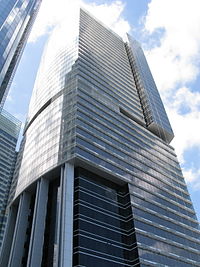- Liberal Party (Hong Kong)
-
Liberal Party
自由黨
Chairperson Miriam Lau Founded 6 June 1993 Headquarters 801-803, Manhattan Place, 23 Wang Tai Road, Kowloon Bay, Kowloon, Hong Kong Ideology Economic Liberalism,
Laissez-faire CapitalismPolitical position Centre-right National affiliation Pro-Beijing camp Official colours Blue, green Legislative Council 3 / 60District Council 15 / 534Website http://www.liberal.org.hk/ Politics of Hong Kong
Political parties
ElectionsLiberal Party (simplified Chinese: 自由党; traditional Chinese: 自由黨; pinyin: Zìyoǘ Dǎng) is a business-friendly liberal conservative political party in Hong Kong.
Contents
Party beliefs
The party is known for its conservative and business-friendly policies. Despite being a political party friendly with Beijing, it fits in the centre-right political spectrum. Although not a libertarian party in the traditional sense, the Hong Kong Liberal Party is an example of a political party with libertarian economic policies such as the opposition of a minimum wage, collective bargaining, and antitrust legislation. The party also supports limited government, low taxes, and a high degree of economic freedom. The party has been fairly neutral on social issues such as universal suffrage, whilst opposing measures that disturb the public sentiment too greatly: the resignation from the Executive Council by its leader James Tien in 2003 prevented the implementation of Article 23 of the Basic Law, which ultimately accelerated the downfall of the Tung administration.
The party does not advocate welfare entitlements. Many of its members are from the merchant and business sectors and see preserving the current state of economic freedom as being the most advantageous in general.
History
 Old logo used until March 2011.
Old logo used until March 2011.
It was originally founded as a party for businesspeople appointed to the Legislative Council by the Government of Hong Kong.
Changes in political stance
It has been alleged that the party began leaning towards the pro-government camp within a few years before the transfer of sovereignty. Under Tung Chee Hwa's administration, it was generally considered a government-ally. Since Donald Tsang took over in November 2005, the party has continued its generally pro-government stance.
In 6 July 2003, James Tien Pei Chun the leader of Liberal Party resigned from the Executive Council of Hong Kong and forced the government to delay the second reading of the legislation to implement Article 23 of the Basic Law. This exception to the party's usual pro-government policy was considered positive in temporarily calming the frictions between the pro-government and the pro-democracy supporters. Others such as those in the Leftist field, however, felt that this demonstrated the opportunistic nature of the party.
At almost the same time, the Liberal Party decided to shift its political stance from "all Legislation members should be directly elected in 2007" to "Hong Kong should become more democratic." The founder and ex-chair of Liberal Party, Allen Lee Peng Fei, decided to leave the party since he believed the change was against public sentiments. Their stance in universal suffrage is now similar to that of the Democratic Alliance for the Betterment of Hong Kong (DAB); namely, that universal suffrage should be implemented in or after 2012 rather than in 2007/8.
In 13 January 2006, the Liberal Party has opposed Chief Executive Donald Tsang's plan of implementing a five day work week for most civil servants, due to concerns that this would put too much pressure on small to medium-sized enterprises to cut their working week down to five days as well. Many large enterprises are still deciding on this matter. Presently, most businesses offer a five and a half day working week. There is no planned legislation to force private employers to commit to a five day working week.
Performance in elections
The Liberal Party saw its greatest success in the 2004 Legislative Council election. With its success in gaining seats from the geographical constituencies through direct elections while retaining those seats in the functional constituencies, the party had its number of seats increased from seven (in 2000 elections) to ten, overtaking the Democratic Party for the first time since 1995 and became the second-largest political party in the legislature.
The fate of the party hung in the balance after its poor showing in the 2008 Legco election. The party won 7 seats, only in the functional constituencies; leader James Tien and deputy leader Selina Chow both lost their seats in the geographical constituency polls following which they resigned their party functions.[1] There were recriminations when Chow blamed the loss of her seat because Heung Yee Kuk chairman and LP member Lau Wong-fat canvassed for the DAB during the elections.[2] Former chairman Allen Lee said that the party was now "doomed" following their poll defeat because of a succession crisis and lack of funding.[1] On 9 October, three councillors, Jeffrey Lam, Sophie Leung, and Andrew Leung, resigned from the Liberal Party, citing internal party disagreements. Lam had been courting for the party leadership since Tien's resignation, with support from Sophie Leung and Andrew Leung. These resignations, along with the resignation of Heung, reduces the Liberal Party from seven Legco councillors to three.[3]
Election Number of votes for Liberal Party Share of votes Geographical constituency seats Functional constituency seats Elections committee seats Total seats 1995 15,126 1.64% 1 9 0 10 1998 50,335 3.40% 0 9 1 10 2000 24,858 1.88% 0 8 0 8 2004 118,997 6.67% 2 8 − 10 2008 65,622 4.33% 0 7 − 7 List of chairmen
- Allen Lee (1993–1998)
- James Tien (1998–2008)
- Miriam Lau (2008-)
References
- ^ a b Gary Cheung, Ambrose Leung & Fanny Fung, "Liberals doomed, says founding chief", 11 September 2008, Page A1, South China Morning Post
- ^ Ambrose Leung & Fanny Fung, "Heung Yee Kuk chairman quits Liberal Party", 12 September 2008, Page A2, South China Morning Post
- ^ Bonnie Chen, "Chaos as Liberal trio revolts", 9 October 2008 The Standard
External links
- Liberal Party official site (Click 'English' in the top right-hand corner for the English version)
 Political parties in Hong Kong
Political parties in Hong KongPan-democracy Democratic Party (8) · Civic Party (5) · People Power (2) · League of Social Democrats (1) · Confederation of Trade Unions (1) · Association for Democracy and People's Livelihood (1) · Neighbourhood and Workers Service Centre (1) · Civic Act-up (1) · Social Workers' General Union (1)Pro-Beijing Democratic Alliance for the Betterment and Progress of Hong Kong (10) · Federation of Trade Unions (4) · Liberal Party (3) · Federation of Hong Kong and Kowloon Labour Unions (1) · New People's Party (1) · Professional Forum (4) · Economic Synergy (4)Politics of Hong Kong · Politics portal · List of political parties by country / in Hong Kong Categories:- Classical liberal parties
- Libertarian parties
- Political parties in Hong Kong
- Politics of Hong Kong
- Political parties established in 1993
- Liberal Party (Hong Kong) politicians
Wikimedia Foundation. 2010.

